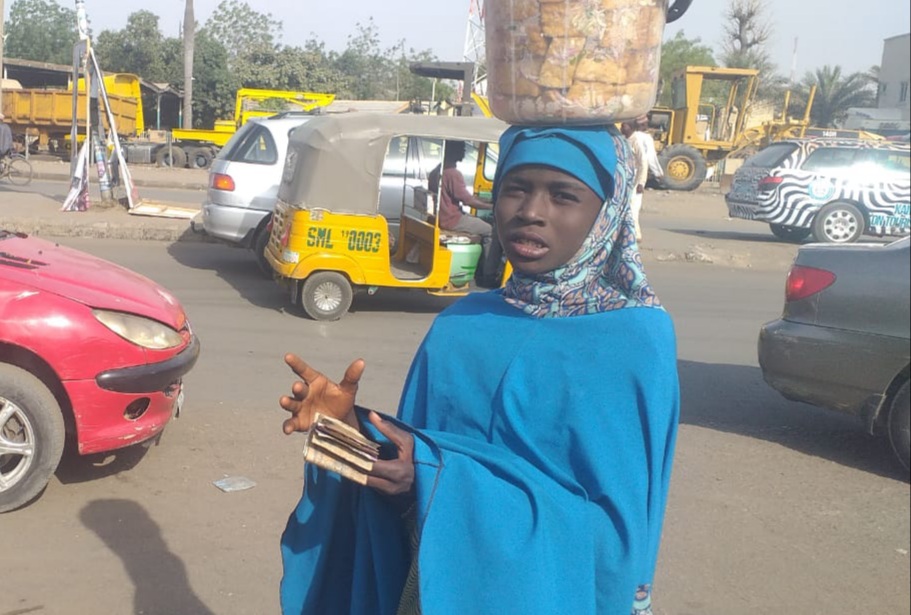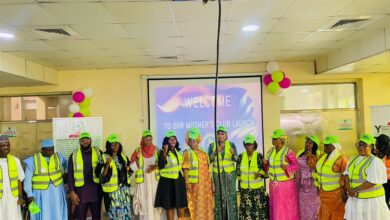SPECIAL REPORT- “My Employer Owes Me Nine Months Salary” -Kano Child Labourer

The International Labour Organisation recently stated that no fewer than 15 million children are engaged in child labour in Nigeria; this is even as the United Nations Educational, Scientific and Cultural Organisation (UNESCO), in its latest global data, said, Nigeria now has about 20 million out-of-school children.
Child labour in Nigeria is the employment of children under the age of 18 in a manner that restricts or prevents them from basic education and development.
Child labour is pervasive in every state of the country. In Kano, a commercial hub in northern Nigeria, the sight of underage children seen doing menial jobs like car wash, street hawking and others carrying plates around begging was common.
A Multiple Indicator Cluster Survey (MICS) report carried out in 2021 by the National Bureau of Statistics (NBS) with support from the United Nations Children’s Fund (UNICEF), said 2,659 children ages 5-11 years were involved in economic activities for at least one hour in Kano.
Also,1118 children ages 12-14 years were engaged in economic activities for 14 hours or more, 982 children ages 15-17 years were engaged in economic activities for 43 hours or more.
A chat with some child labourers and their parents in the state revealed that the country had a long way to go in eradicating child labor and giving its less privileged children a fair chance at education, health, nutrition and other necessities.
The victims, who narrated their experiences in hausa gave reasons for engaging in labour to include economic hardship, hunger, e.t.c. Many of them dropped out of school very early in life due to lack of sponsorship.
15-year-old Khadija Usman dropped out of school for cheap labour to help her poor parents, whom she said needed her financial assistance to survive.
She said, “I leave home early in the morning and only return in the evening. My salary is N2,000 per month. Now, my employer owes me nine months salary.
“They give me food which I take to my parents and siblings, who always wait for my return to eat. They have no other means but this”.
A teenage hawker, Yusra Ibrahim, disclosed how she had to hawk to feed her aging mother.
She said, “I don’t go to any school and this pains me a lot.
“I spend all my life hawking since we must eat to survive. I don’t go to school because my old mother cannot afford to pay for my school fees, buy me books and pay for my transportation.
“Although I was never arrested in the course of hawking, I’m ready to stop, if only I could get any empowerment from the government.”
17-year-old Sadiya Aminu said the biting economic hardship in the country forced her into child labour. The situation was so frustrating that she had to drop out of school.
Sadiya Aminu said, “I want to continue with my studies only that my parents could not afford it. But I am tired of this work because the N2000 I earn as my salary is never enough to change our condition.
“To add insult to my condition, the people I work for treat me so badly. I want to leave the job.
But Sadiya Aminu denied knowledge of any policy to end child labour in the state.
We Are Not Prostitutes
A hawker, Amina Shu’aibu, decried the way some people mistake hawkers for prostitutes.
Accordingly, the 17-year-old Amina revealed her great passion to continue with her studies.
She said, “I hate the way people view us in society. They forget this is what life has thrown to us. As a result, we don’t have any alternative than to hawk.
“For me if only the government will take my responsibilities, I am ready to go back to school.”
I Sent Out My Two Kids To Work – Mother
A mother of five, Aisha Abdurrahman, disclosed how she sends two of her older kids to work.
She said, “We don’t have any other alternative. Sometimes we only eat twice and sometimes once. All the five kids do not go to school.
“However, it pains me every morning when I see other kids of their age going to schools and my kids rushing to go to work.”
A 60-year-old Hauwa Garba said she sends her adopted daughter to work because there is nobody to cater for them.
She said, “The girl is not my daughter; I adopted her. But because I’m old and my husband is dead, I had to allow her to go to work so that we could eat.
“Her employers do not pay her. They give her food instead, which she eats and brings the remaining to me,” said the old woman.
We’re Opting For Technology To End Begging, Hawking – Gov’t
On the other hand, the Kano State Government said it would apply technology to end begging and hawking in the state.
The Director Kano State Agency for Evacuation and Repatriation of Beggars, Muhammad Albakari Mik’il, said the state government has come up with many policies to sanitize the streets of the state of beggars.
He said the agency has been consistent in its operation to end the menace in the state, saying many policies were enacted in this regard.
He said, “There are many policies and programs put in place to end street begging and wandering by small kids in the state.
“Our personnel go on duty anytime; morning, afternoon and evening. Sometimes we go out at night around 12:30 am and will not be back until 4:00 am to ensure these kids do not roam streets, markets and other public places.
“It is sad that most parents do not bother to take the responsibilities of their kids as they were enjoined to. However, they rather sent them to hawk, beg and wander in the street in search of food and water to quench their thirst.
“To survive, some of these kids labourers, find houses to work as errands boys and girls for some little amount of money or food. Sometimes they were employed to wash dishes or any other home work.
Law Banning Street Begging In Place
However, Albakari Mik’il said the state government had in 2013 enacted a law that banned street begging and declared wandering by small kids unlawful.
He said, “After this board was established, we wrote to the state governor requesting for amendment with regards to the lopsided in the initial law. This, we believe, will help in curving the issue.
“Some of the challenges we face are; sometimes after giving a bail of such kids on the condition that they would be enrolled in school, they continue to roam the streets.
“To tackle this, we now plan to provide software to enable us tract whether a kid has ever been arrested by our personnel. The software will provide demographic information, pictures and thumbprints of any kid arrested.
“The moment our software indicates that a kid was arrested for a second time, we will take him to the court.
“Another challenge is that some of our community members thought the policy was to stop Qur’anic schools, which was not true.
“There was a time we went on a patrol and arrested 503 small kids in a single night. Among the kids, some of whom were 12-year old, only 12 kids were almajiri, the remaining were beggars and hawkers.
“Some of these kids, as it might surprise you, were selling drugs and steal from shops and other public places. And women among them engage in prostitution.”
The public relations officer, Kano State Hisbah Board, Lawan Ibrahim Fagge, Lawan Ibrahim Fagge, the board is taking some measures arrest the situation.
He said, “We used to receive such cases where young kids would be brought to the city, mostly by their parents or relatives, to work for in rich people’s houses.
“Most of these kids, who are supposed to be in school, devote their precious time only to work at a cheaper price; washing dishes, cooking food and taking care of babies.
“Our board gathered that most of these kids, who found their way here from villages, were into this business because they didn’t have any other alternative, or worse, forced to do so by their selfish parents.
“As part of the preventive measures, when we come across such cases, we used to trace their background and the people involved in their misery.
“We often questioned their parents on why they leave their kids to labour and told them about the Islamic stand about such works.
“If their employers mistreat them, we brought them before the board to admonish them. Moreover, we also make them apologise, take their responsibilities and enroll them in schools.
“To ensure the kids are well taken care of, we assign some of our personnel to monitor how things are going. If they break their promises and continue to mistreat a kid, we strictly dragged them to court for legal actions.
We Are Working With Traditional Rulers To Eradicate Child Labour
Lawan Ibrahim Fagge added that the board is synergizing with traditional rulers in various communities in the state to put the situation under control.
He added, “We also involved the traditional rulers to know what was going on in their communities and religious leaders to tell both the parents and employers about the Islamic injunctions pertaining to labour”.
Although some children were still loitering the streets and others involved in economic activities during school hours, the Public Relation Officer, Kano State Ministry of Education, Kano state, Aliyu Yusuf, said the state government’s efforts to enhance learning through eradicating child labour, hawking and street begging have been impactful.
Aliyu said the government’s efforts are fruitful and have resulted to an increase in the number of students’ enrolment in school across the state.
In his words: “There has been an increase in the number of students’ enrolment to school in Kano. But you know Kano is a very big state. For this, it is difficult to realize this impact in a short-time period, let alone providing any statistics.
“But I know because of this increase in the number of enrolment the Kano state government has built many schools in Bagwai, Kiyawa, Bunkure and Kanwa in Madobi local government areas of the state”.
Ideally, one would expect massive school enrollment since Government had made education free and compulsory for all. However, the reverse is the case. Therefore, government must ensure strict punishment for employers of child laborers as stipulated in the law.
Article 32 (1) of the Convention on the Rights of the Child states: “States Parties recognize the right of the child to be protected from economic exploitation and from performing any work that is likely to be hazardous or to interfere with the child’s education, or to be harmful tothe child’s health or physical, mental, spiritual, moral or social development”.
The Federal Republic of Nigeria Official Gazette No. 32, adopted on 26th March 2015, volume 102 referred to as ‘Trafficking in Person (Prohibition) enforcement and Administration Act 2015’, part iv, No. 23 on Employment of Child as Domestic Worker and Inflicting grievous harm states the following
about child labour:
(1) Any person who: (a) employs, requires, recruits, transports, harbors or hires out a child under the age of 12 years as a domestic worker, commits an offence and is liable on conviction to imprisonment for a minimum term of 6 months and not exceeding 7 years.
(b) employs, requires, recruits, transport, harbors, receives or hires out a child to do any work that is exploitable, injurious or hazardous to the physical, social and psychological development of the child, commits an offence and is liable on conviction to imprisonment for a minimum term of 2 years but not exceeding 7 years without an option of fine.
(2) Notwithstanding the punishment prescribed in subjection (1) of this section, a convicted person under this section shall, in addition to the prescribed punishment, be liable to:
(a) A term of not more than 2 years imprisonment where a child is denied payment or reasonable compensation for services rendered; or (b) A term of not more than 3 years where the child is defiled or inflicted with bodily harm.






